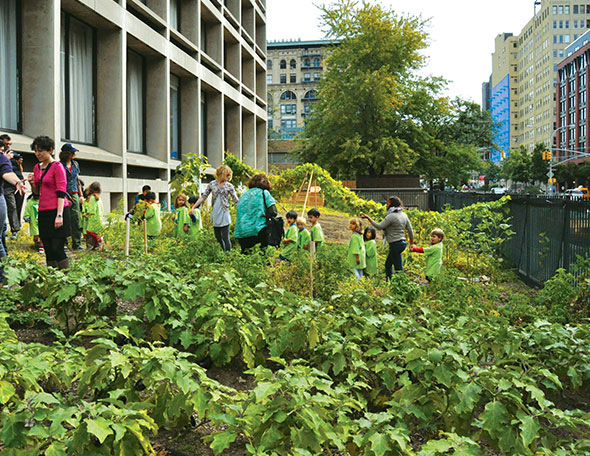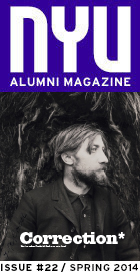food studies
Green (.07) Acres
by Erin Wylie / CAS ’03
We all know that a tree can grow in Brooklyn, but can nine varieties of heirloom tomatoes flourish next to Houston Street’s six-lane thoroughfare? Yes, as proven by NYU’s Urban Farm Lab, a 115'-x-25' plot located behind Silver Towers and accessible to anyone in the NYU fold.
This newcomer community space is essentially an outdoor classroom designed to give faculty, Silver Towers residents, and students of all levels—from University Plaza Nursery School kindergarteners to doctoral candidates—hands-on agrarian learning opportunities previously not available in Greenwich Village.
Although communal gardens in the Big Apple date back to 1973, Urban Farm Lab is groundbreaking for many reasons, says Jennifer Berg (STEINHARDT ’96, ’06), who is directing the initiative along with fellow food studies associate professor Amy Bentley. “It’s the first academic agriculture project in New York City on a landmarked site—with Landmarks Preservation Commission approval!” Berg notes proudly. While plenty of college campuses have gardens, Berg points out that most of them don’t have to contend with the scale and visibility of NYU. “A farm like this does not exist in a university of our size,” she says. “The types of conversations I’d have with people while I was working out here were just incredible. Passersby would ask me, ‘Does NYU know you’re out here?’ I’d say, ‘Yeah, NYU paid for it.’ They were floored.”
It did take a few years for this green project to get the green light: It was first proposed in 2010 by Daniel Bowman Simon (STERN ’01, WAG ’13, STEINHARDT ’16) and Christina Ciambriello (STEINHARDT ’13), both enrolled in the Steinhardt School of Culture, Education, and Human Development’s food studies program, who envisioned the farm as a way of reconnecting with NYU’s lost legacy of educational agriculture. (In the early 1900s, the university was the first to host a department of school gardens under the watch of Chancellor Elmer Ellsworth Brown.) The endeavor stalled until two years later when Berg, who served as an adviser on the initial proposal, was told that there was interest in an agriculture project at the site. After winning funding, thanks to a Green Grant from NYU’s Office of Sustainability, the farm was finally approved early last year.
On May 31, 2013, Berg and Bentley, along with a small group of students, began transforming the unmanicured backyard of Silver Towers into a farm with 18 raised beds made fertile with composted organic matter from NYU dorms—“so, like, Weinstein garbage,” Berg says wryly. (Next season, the farm will begin composting its own waste along with scraps from Steinhardt’s teaching kitchens.) Despite what Berg calls a “tragically late” start by planting in June, the farm’s organic, pesticide-free bounty included those aforementioned tomatoes along with arugula, bell peppers, carrots, eggplant, lettuce, okra, radishes, strawberries, watermelon, and herbs such as basil, chives, rosemary, sage, and lemon verbena. The produce was used by food studies students, shared with Silver Towers residents, and cooked into a feast for a September harvest festival, but it’s important to remember that the project is not about growing prize-winning edibles. “We want to generate agricultural knowledge—that’s where the lab part comes in,” Berg says. “In food studies, you can theorize about environmental conservation and about connection to food on communal and societal levels. This is the experiential way that our students are actually learning it.”





